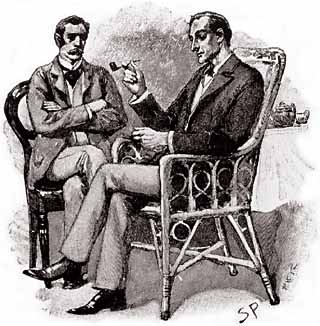| The Greek Interpreter 1 | The Greek Interpreter 2 |
DURING my long and intimate acquaintance with Mr. Sherlock Holmes I had never heard him refer to his relations, and hardly ever to his own early life. This reticence upon his part had increased the somewhat inhuman effect which he produced upon me, until sometimes I found myself regarding him as an isolated phenomenon, a brain without a heart, as deficient in human sympathy as he was preeminent in intelligence. His aversion to women and his disinclination to form new friendships were both typical of his unemotional character, but not more so than his complete suppression of every reference to his own people. I had come to believe that he was an orphan with no relatives living; but one day, to my very great surprise, he began to talk to me about his brother.
It was after tea on a summer evening, and the conversation, which had roamed in a desultory, spasmodic fashion from golf clubs to the causes of the change in the obliquity of the ecliptic, came round at last to the question of atavism and hereditary aptitudes. The point under discussion was, how far any singular gift in an individual was due to his ancestry and how far to his own early training.
“In your own case,” said I, “from all that you have told me, it seems obvious that your faculty of observation and your peculiar facility for deduction are due to your own systematic training.”
“To some extent,” he answered thoughtfully. “My ancestors were country squires, who appear to have led much the same life as is natural to their class. But, none the less, my turn that way is in my veins, and may have come with my grandmother, who was the sister of Vernet, the French artist. Art in the blood is liable to take the strangest forms.”
“But how do you know that it is hereditary?”
“Because my brother Mycroft possesses it in a larger degree than I do.”
This was news to me indeed. If there were another man with such singular powers in England, how was it that neither police nor public had heard of him? I put the question, with a hint that it was my companion’s modesty which made him acknowledge his brother as his superior. Holmes laughed at my suggestion.
“My dear Watson,” said he, “I cannot agree with those who rank modesty among the virtues. To the logician all things should be seen exactly as they are, and to underestimate one’s self is as much a departure from truth as to exaggerate one’s own powers. When I say, therefore, that Mycroft has better powers of observation than I, you may take it that I am speaking the exact and literal truth.”
“Is he your junior?”
“Seven years my senior.”
“How comes it that he is unknown?”
“Oh, he is very well known in his own circle.”
“Where, then?”
“Well, in the Diogenes Club, for example.”
I had never heard of the institution, and my face must have proclaimed as much, for Sherlock Holmes pulled out his watch.

“The Diogenes Club is the queerest club in London, and Mycroft one of the queerest men. He’s always there from quarter to five to twenty to eight. It’s six now, so if you care for a stroll this beautiful evening I shall be very happy to introduce you to two curiosities.”
Five minutes later we were in the street, walking towards Regent’s Circus.
“You wonder,” said my companion, “why it is that Mycroft does not use his powers for detective work. He is incapable of it.”
“But I thought you said– –”
“I said that he was my superior in observation and deduction. If the art of the detective began and ended in reasoning from an armchair, my brother would be the greatest criminal agent that ever lived. But he has no ambition and no energy. He will not even go out of his way to verify his own solutions, and would rather be considered wrong than take the trouble to prove himself right. Again and again I have taken a problem to him, and have received an explanation which has afterwards proved to be the correct one. And yet he was absolutely incapable of working out the practical points which must be gone into before a case could be laid before a judge or jury.”
“It is not his profession, then?”
“By no means. What is to me a means of livelihood is to him the merest hobby of a dilettante. He has an extraordinary faculty for figures, and audits the books in some of the government departments. Mycroft lodges in Pall Mall, and he walks round the corner into Whitehall every morning and back every evening. From year’s end to year’s end he takes no other exercise, and is seen nowhere else, except only in the Diogenes Club, which is just opposite his rooms.”
“I cannot recall the name.”
“Very likely not. There are many men in London, you know, who, some from shyness, some from misanthropy, have no wish for the company of their fellows. Yet they are not averse to comfortable chairs and the latest periodicals. It is for the convenience of these that the Diogenes Club was started, and it now contains the most unsociable and unclubable men in town. No member is permitted to take the least notice of any other one. Save in the Stranger’s Room, no talking is, under any circumstances, allowed, and three offences, if brought to the notice of the committee, render the talker liable to expulsion. My brother was one of the founders, and I have myself found it a very soothing atmosphere.”
| The Greek Interpreter 1 | The Greek Interpreter 2 |